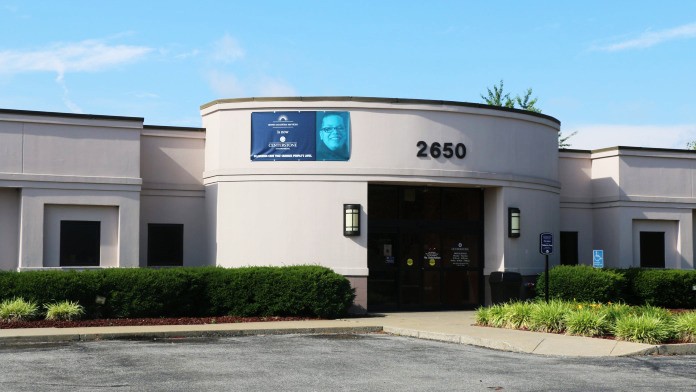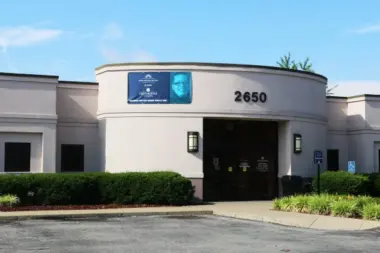They are rude half of the time when you call, you get there and who the person you have an appointment with isn't even there.
About Seven Counties Services
Home to the Kentucky Derby, Louisville, Kentucky also features Seven Counties Services. Established in 1978, this Community Mental Health Center provides a full continuum of care for substance abuse, mental health conditions, and developmental and intellectual disabilities. From detox to recovery housing, adults can access comprehensive care to reach recovery.
Whether you can live at home and attend treatment or need 24/7 support, they strive to meet you at any recovery stage. Each program provides proven therepuetic approaches including, comprehensive assessments, counseling, peer support, medication assisted treatment, drug testing, and more. These approaches can help you understand and address the underlying behaviors contributing to addiction.
Free, Accessible Care for Pregnant Women
What strikes me most is their Project Link program. This track provides free case management and peer support services for pregnant women battling addiction. You can access assistance and linkages to local resources.
Transportation to doctors’ appointments, OB/GYN care, addiction education and treatment, mental health care, assistance securing baby necessities, and more are available. I think this is a great opportunity to get the help you need and set you and your baby up for a brighter future.
Helping Young People Navigate DUI Challenges
Another great feature is their Zero-Tolerance Under 21 DUI Program. Young people aged 16 to 20 who are facing a DUI offense can participate in this program. They provide an initial screening, help you find placement for educational classes, and connect you to community services and counseling.
Fostering Life Skills for Independent Living
I also think it’s great that they offer occupational therapy. You’ll benefit from ongoing support to rebuild your skills and confidence. That way you can gain the tools to adapt to life after treatment and sustain recovery.
Latest Reviews
Rehab Score
Gallery


Accepted Insurance
Other Forms of Payment
Medicaid is a state based program that helps lower-income individuals and families pay for healthcare. Medicaid covers addiction treatment so those enrolled can use their coverage to pay for rehab. When a program accepts Medicaid the client often pays very little or nothing out of their own pocket.
Private insurance refers to any kind of healthcare coverage that isn't from the state or federal government. This includes individual and family plans offered by an employer or purchased from the Insurance Marketplace. Every plan will have different requirements and out of pocket costs so be sure to get the full details before you start treatment.
Self-pay involves paying for treatment out of your own pocket. You can use savings or credit, get a personal loan, or receive help from family and friends to fund your treatment. If you don't have insurance or your insurance plan doesn't cover a specific program, self-pay can help ensure you still get the care you need.
Sliding scale payments are based on a client's income and family size. The goal is to make treatment affordable to everyone. By taking these factors into account, addiction recovery care providers help ensure that your treatment does not become a financial burden to you or your family, eliminating one barrier to care.
Medicare is a federal program that provides health insurance for those 65 and older. It also serves people under 65 with chronic and disabling health challenges. To use Medicare for addiction treatment you need to find a program that accepts Medicare and is in network with your plan. Out of pocket costs and preauthorization requirements vary, so always check with your provider.
Addiction Treatments
Levels of Care
Outpatient programs are for those seeking mental rehab or drug rehab, but who also stay at home every night. The main difference between outpatient treatment (OP) and intensive outpatient treatment (IOP) lies in the amount of hours the patient spends at the facility. Counseling Services include assessments and individual, group and family counseling.
Completing a drug or alcohol rehab program shouldn’t spell the end of substance abuse treatment. Aftercare involves making a sustainable plan for recovery, including ongoing support. Peer Support Services are led by people who have a diagnosis of a serious mental illness and are in recovery; this program helps others achieve their own successes.
Intensive Outpatient Programs (IOP) are for those who want or need a very structured treatment program but who also wish to live at home and continue with certain responsibilities (such as work or school). IOP substance abuse treatment programs vary in duration and intensity, and certain outpatient rehab centers will offer individualized treatment programs.
Treatments
Many of those suffering from addiction also suffer from mental or emotional illnesses like schizophrenia, bipolar disorder, depression, or anxiety disorders. Rehab and other substance abuse facilities treating those with a dual diagnosis or co-occurring disorder administer psychiatric treatment to address the person's mental health issue in addition to drug and alcohol rehabilitation.
Mental health rehabs focus on helping individuals recover from mental illnesses like bipolar disorder, clinical depression, anxiety disorders, schizophrenia, and more. Mental health professionals at these facilities are trained to understand and treat mental health issues, both in individual and group settings.
Substance rehabs focus on helping individuals recover from substance abuse, including alcohol and drug addiction (both illegal and prescription drugs). They often include the opportunity to engage in both individual as well as group therapy.
Programs
Adult rehab programs include therapies tailored to each client's specific needs, goals, and recovery progress. They are tailored to the specific challenges adult clients may face, including family and work pressures and commitments. From inpatient and residential treatment to various levels of outpatient services, there are many options available. Some facilities also help adults work through co-occurring conditions, like anxiety, that can accompany addiction.
Young adulthood can be an exciting, yet difficult, time of transition. Individuals in their late teens to mid-20s face unique stressors related to school, jobs, families, and social circles, which can lead to a rise in substance use. Rehab centers with dedicated young adult programs will include activities and amenities that cater to this age group, with an emphasis on specialized counseling, peer socialization, and ongoing aftercare.
Clinical Services
Research clearly demonstrates that recovery is far more successful and sustainable when loved ones like family members participate in rehab and substance abuse treatment. Genetic factors may be at play when it comes to drug and alcohol addiction, as well as mental health issues. Family dynamics often play a critical role in addiction triggers, and if properly educated, family members can be a strong source of support when it comes to rehabilitation.
Group therapy is any therapeutic work that happens in a group (not one-on-one). There are a number of different group therapy modalities, including support groups, experiential therapy, psycho-education, and more. Group therapy involves treatment as well as processing interaction between group members.
In individual therapy, a patient meets one-on-one with a trained psychologist or counselor. Therapy is a pivotal part of effective substance abuse treatment, as it often covers root causes of addiction, including challenges faced by the patient in their social, family, and work/school life.
Life skills trainings involve all the skills a person must have in order to function successfully in the world. These include time management, career guidance, money management, and effective communication. Truly successful addiction recovery is based on the ability to not only live substance-free, but to thrive. Life skills teaches the practical necessities of functioning in society, which sets clients up for success in life, and therefore sobriety.
Trauma therapy addresses traumatic incidents from a client's past that are likely affecting their present-day experience. Trauma is often one of the primary triggers and potential causes of addiction, and can stem from child sexual abuse, domestic violence, having a parent with a mental illness, losing one or both parents at a young age, teenage or adult sexual assault, or any number of other factors. The purpose of trauma therapy is to allow a patient to process trauma and move through and past it, with the help of trained and compassionate mental health professionals.
Staff & Accreditations
Staff
David Pankotai, MA, LPC
CEO
Elizabeth McKune, Ed.D.
COO
Dr. Scott Hedges, MD, FAPA, OCDS
Chief Medical Officer & Director of Laboratory Services
Eric Post, MBA, CPA, CGMA
CFO
Susan Rittenhouse, M.S.
Chief Administrative Officer
Sara Smith, SPHR, HCS, SHRM-SCP
Chief People Officer
Tracey Garnett, MBA
VP of Finance
Becky Wolf, MSW
VP of Developmental Services
Accreditations

The Joint Commission, formerly known as JCAHO, is a nonprofit organization that accredits rehab organizations and programs. Founded in 1951, the Joint Commision's mission is to improve the quality of patient care and demonstrating the quality of patient care.
Joint Commission Accreditation: Yes
Contact Information
2650 West Broadway
Louisville, KY 40211




